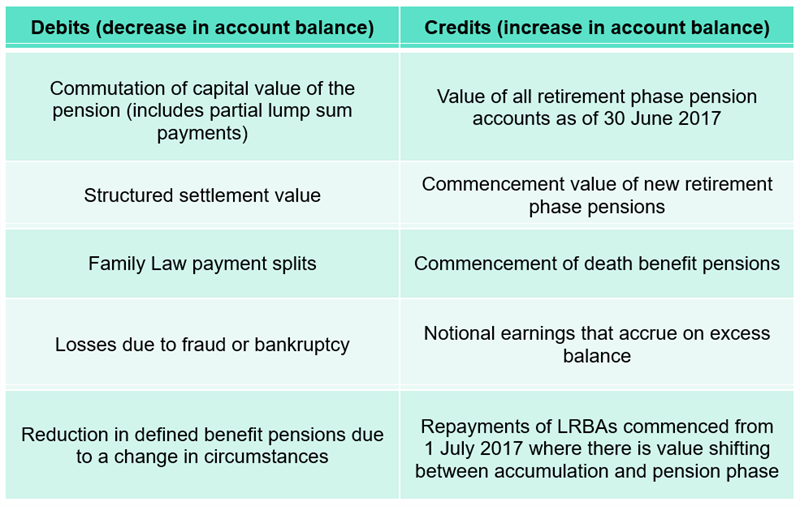
Senior SMSF Technical Specialist.png?sfvrsn=cfba253f_0)
The introduction of a Transfer Balance Cap (TBC) from July 2017 brought about a limit on how much an individual could transfer from their accumulated superannuation interest into retirement phase pensions.
In a recent article I discussed the pending increase of this cap limit. In this article I want to concentrate on the reporting obligations for Self Managed Super Funds (SMSF).
In order to track an individual’s use of their TBC a Transfer Balance Account (TBA) is created to record necessary transactions from the time they first have a retirement phase pension interest.
Transactions are recorded based on the reporting of various events (refer below table). The most common being the commencement of retirement phase pensions and commutations from those pensions.

Under current law, SMSFs will either be:
• Quarterly reporters – reporting of events required to be lodged within 28 days after the end of the quarter in which it occurs.
• Annual reporters – events to be reported no later than the lodgement of the SMSF’s Annual Return for the year in which the event occurs.
I won’t go into greater detail, as this is about to change.
From 1 July 2023 there will be no distinction as all SMSFs required to report transfer balance account events will be considered quarterly reporters.
This will also capture all reportable events that may have occurred in the 2022/23 financial year. In effect, all reportable events that occur from 1 July 2022 – 30 September 2023 will have a reporting date of 28 October 2023.
There will be no grandfathering of the old rules either. Funds that were previously identified as annual reporters will be quarterly reporters from 1 July 2023 and will need to consider the above-mentioned reporting date for events that have, or will occur, this financial year.
Existing quarterly reporters do not receive an extension to lodge and will still need to report events from the 2022/23 financial year on a quarterly basis.
Going forward, reporting dates will be:

There will continue to be some instances where reporting must occur earlier:
• Commutations resulting from a member voluntarily responding to an excess determination are to be reported within 10 business days after the end of the month in which the event occurs.
• Commutations required due to the receipt of a commutation authority from the ATO must be reporting within 60 days of the authority being issued.
For those that still have their financial accounts processed on an annual basis, this may require a rethink in the way they deal with their accountant/administrator. As it is often these professionals that assist with the lodging of the Transfer Balance Account Reports (TBAR), they will need to be aware of any events in a more timely manner.
Although I am a personal fan of having accounts/transactions processed on a more regular basis, I appreciate that this is not for everybody. The need to report events does not necessarily require accounts to be up to date, although it is preferred.
Estimated values of the event can be lodged, with more accurate information reported via an amendment at a later date. However, this does create inefficiencies as the reporting mechanism is often linked to the software the transactions are processed in. Having to create ‘dummy entries’ in order to lodge a TBAR will result in double handling and increase the chances of errors occurring.
The change in reporting requirements may also assist in stamping out the perception of past practices of making decisions after the fact.
Although the ATO have made it clear that a pension cannot commence any earlier than the date it is requested and that lump sum payments (commutations) must be requested prior to the payment being made, we still see some people looking to retrospectively apply commencements and/or commutations.
Considering these transactions as part of processing the year end accounts, rather than at the time they occur, may led to the late lodgement of the TBAR.
Strategies that are set up at the beginning of the year to allocate regular withdrawals as pension payments until such time as the minimum requirement is achieved and then allocate additional payments as commutations will also require additional oversight.
It is one thing to have the strategy in place, it is another to know when the payments switch from being pension withdrawals and treated as commutations and become reportable.
Transfer balance account reporting is akin to the requirement to lodge tax returns and activity statements in that, late lodgement may lead to penalties for failure to lodge on time. A penalty unit, currently $275, can apply for each 28 days (or part thereof) that a report is lodged late. Up to a maximum of 5 penalty units.
While the ATO have chosen not to apply penalties for late lodgement to date, it cannot be expected that this will continue. With the streamlining of reporting and having all SMSFs on the same reporting regime, it will be easier for the ATO to start imposing penalties.
It is important to note that there is only a requirement to lodge if there are events that need to be reported. Unlike an activity statement, for example, where you may still be required to lodge a nil statement when there is nothing to report, transfer balance account reporting is driven by an actual reportable event.
Despite the changes to bring all SMSFs within the same reporting timeframes, they still have different obligations to APRA funds i.e. industry and retail funds.
APRA funds are required to report TBA events within 10 business days of the event occurring.
This has and will continue to create issues when superannuation benefits are being transferred between SMSFs and APRA funds, particular where pension commutations and commencements occur.
Consider a member who commutes their pension in an SMSF on 1 April in any given year. The earliest this is required to be reported by the trustees of the SMSF is 28 July of that year.
Let’s assume the commuted amount was rolled to an APRA fund and used to commence a new retirement phase pension on 2 April. This will need to be reported by that fund around the middle of April.
If the APRA fund reports the commencement before the SMSF reports the commutation this will result in an overstated value of the member’s TBA. Possibly even leading to an excess determination being issued by the ATO. Although this can be fixed relatively easily it can create unnecessary concern and stress for the member.
This highlights that reporting as soon as possible may be a better approach than delaying reporting and only looking to report withing the timeframe requirements.
Given the pending increase in the general transfer balance cap from 1 July 2023 and the implications for personal transfer balance caps, the sooner events are reported, the sooner these values can be correctly determined.
Shorter reporting timeframes are likely to put additional pressure on accountants/administrators and trustees and their advisers alike. It is important that communication relating to reportable events occurs in a timely manner and not be left to consider when preparing year end accounts. This is especially important for those clients that have previously been able to lodge their TBARs at the same time as lodging their SMSF Annual Return as a change in behaviour may be required.